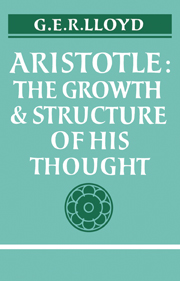Book contents
- Frontmatter
- Contents
- Preface
- Abbreviations
- PART I INTELLECTUAL DEVELOPMENT
- 1 Life and writings
- 2 The pupil of Plato
- 3 The critic of Plato
- 4 The philosopher of nature
- 5 The founder of systematic research
- PART II FUNDAMENTALS OF ARISTOTLE'S THOUGHT
- Suggestions for farther reading
- Glossary of Greek terms
- Index of passages referred to
- General Index
5 - The founder of systematic research
Published online by Cambridge University Press: 06 July 2010
- Frontmatter
- Contents
- Preface
- Abbreviations
- PART I INTELLECTUAL DEVELOPMENT
- 1 Life and writings
- 2 The pupil of Plato
- 3 The critic of Plato
- 4 The philosopher of nature
- 5 The founder of systematic research
- PART II FUNDAMENTALS OF ARISTOTLE'S THOUGHT
- Suggestions for farther reading
- Glossary of Greek terms
- Index of passages referred to
- General Index
Summary
So far I have discussed three main features of Aristotle's intellectual development, the influence that Plato had on the young Aristotle, his reaction against the principal tenets of his master's philosophy, and the development of his interests in natural science, particularly in biology. But in concentrating on the main lines of his intellectual development during the earlier part of his life many other aspects of his work have necessarily been neglected. Yet from the beginning the range of problems that engaged his attention was wide, and it is now time to do more justice to this fact before turning to consider the chief characteristics of his work during the final period of his life.
As a young man in the Academy Aristotle would have discussed not only the ontological and epistemological questions connected with the theory of Forms, but also a large number of other subjects which certainly included logic or dialectic, ethics, politics and psychology. In each of these fields criticisms of Platonic theses are the startingpoint of some of Aristotle's own theories, and in some cases these criticisms may well have begun to take shape while he was still Plato's pupil. In logic, for example, the nature of dialectic and the difference between the dialectician and the sophist are discussed at some length by Plato in the later dialogues. Academic debates on these topics undoubtedly provide the background against which Aristotle developed his own complex classification of the different main branches of reasoning, demonstrative, dialectical, rhetorical and eristic, and it is natural to suppose, in this instance, that this analysis is, in the main, a product of the period of his first residence in Athens.
- Type
- Chapter
- Information
- AristotleThe Growth and Structure of his Thought, pp. 94 - 108Publisher: Cambridge University PressPrint publication year: 1968

